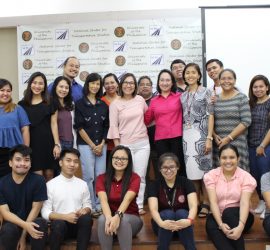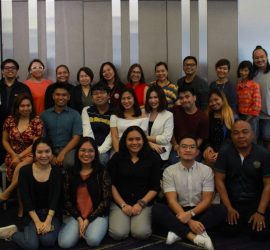The NSTP Diliman Office conducted a follow-up Writeshop on OBEdization of Common Module Topics Syllabi last December 9, 2019, in Toyota Training Room, National Center for Transportation Studies, UP Diliman. The writeshop was a continuation of the October 9, 2019 workshop on the academic improvement of the NSTP Common Module. Attended by NSTP implementers from different colleges within UPD, the workshop was headed by Dir. Arlyn Macapinlac of the NSTP Diliman Office and Dir. Rosella Torrecampo of the Office for the Advancement of Teaching (OAT). Changing, refining, and polishing the drafted common modules were primary goals of the workshop. Dr. Torrecampo headed the discussion and reminded the participants of the value of having assessment activities as these are integral in the creation of discussion-oriented modules. Through her inputs during the group consultations, the participants were able to provide activity choices that may be used by the instructors as supplementary learning opportunities. Participants for the Module 1 NSTP Tatak UPD Orientation were given the tasks to adjust the drafts from the previous workshop in Hive Hotel to satisfy the requirements of the refined matrix. The group deemed it more realistic to just have one reaction paper and a creative group performance as synthesis activities for the entire module rather than having one reaction paper per core topic in the module. The group also made necessary adjustments in the time allotment per core topic. Those who joined the Module 2 Understanding the Self and Others writeshop were asked to polish the module’s objectives by aligning the learning objectives, outline of topics, key questions, and assessment questions. The participants were given the task of drawing the draft modules that should be able to define the active role of NSTP students in helping the UP community by being reflective on their role as scholars of the nation. For Modules 3 Human Dignity and Human Rights and 4 Gender and Development/UP ASH Code, the group ensured that there is an assessment activity per topic. The group also saw the need for an evaluation plan per activity and for more updated reference materials. For Module 5 […]
Daily Archives: March 13, 2020
The NSTP Diliman Office held its API Writeshop on OBEdization of NSTP Common Module Topics Syllabi last October 14, 2019 at Hive Hotel, Quezon City. The whole-day workshop was attended by NSTP coordinators and instructors and facilitated by Prof. Rosella Torrecampo from the Office for the Advancement of Teaching and Prof. Arlyn Macapinlac from the NSTP Diliman Office. Director Macapinlac’s opening remarks reminded the attendees of how the new NSTP module continuously pursues the creation of a more holistic experience for the students through the OBEdized syllabus. She reiterated that the new module wants to ”develop service to the nation through empowerment and participatory leadership” of students. After her address, Director Macapinlac introduced Prof. Rosella Torrecampo as the workshop’s resource speaker. She also encouraged all the participants to develop learning objectives that target higher order thinking skills such as analysis and application, and highlighted that “Tatak UPD NSTP” aspires to produce UP Diliman students who are nationalistic, visionary, and competent. With this in mind, the OBEdization of the NSTP Common Module was geared towards a student-centric approach anchored on the objectives of the module. The current Common Module consists of eight (8) Common Module Topics (CMT). First, CMT1 introduces the course through the NSTP Tatak UPD Orientation followed by CMT2 which focuses on Understanding the Self and Others. CMT3 and CMT4 discuss Human Dignity and Human Rights, and Gender and Development/Anti-Sexual Harassment Code (ASH Code), respectively. CMT5 tackles Citizenship Training. Furthermore, Disaster Risk Reduction Management and Basic Life Saving are covered in CMT6a and 6b while Environmental Protection will be taught in CMT7. The conceptualization of CMT8 is a new addition to NSTP Common Module which intends to cover the topic of Drug Education. In order for the attendees to grasp the nature of this new topic, Dr. Maria Daniela Bantiles, Chief of UP Health Service Public Health Unit and University Health Service Deputy Director, served as a resource person and gave her key insights regarding the intended learning outcomes of CM8. Her points were inspired by the content of the Comprehensive Dangerous Act of 2002. With the collaborated insights from Dr. […]


